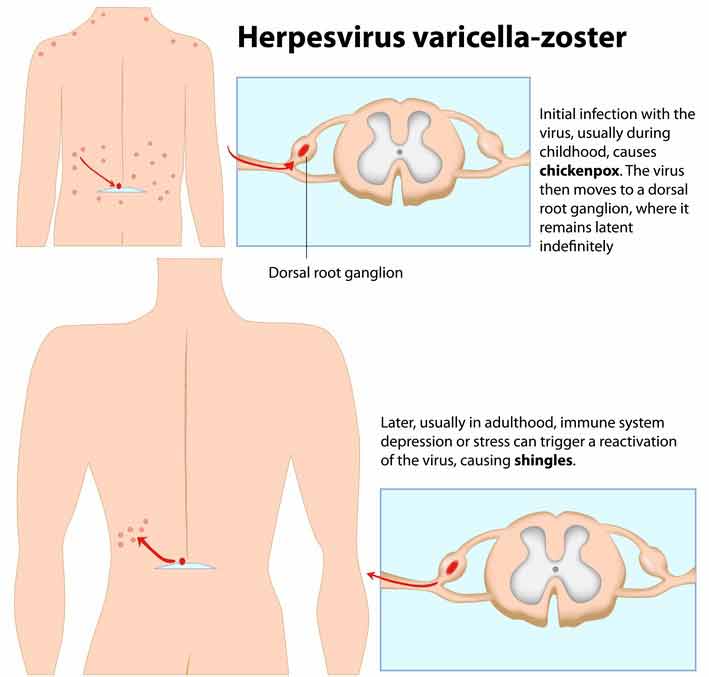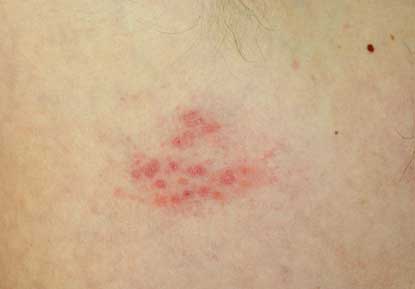Herpes Zoster | Shingles | Do you know chicken pox causes Shingles?
Herpes zoster, also referred to as Shingles, causes pain and often causes a blistering skin rash. Varicella-zoster, (VZV) a member of the herpesvirus, causes chickenpox, mostly with children, and the same virus also causes herpes zoster in adults. Almost 1 out of 3 people will develop shingles in the United States.
Herpes Zoster, Shingles, Varicella Zoster Virus (VZV), HHV-3

Herpes Zoster sores around the waist
Chickenpox Before Shingles
Most cases of chickenpox occur in people who are younger than 15 years of age, but adults can also get chickenpox. Symptoms of chickenpox include hundreds of itchy, fluid-filled blisters, which after a day or two, the blisters become cloudy and then scab. Most children can have a fever, headache, upset stomach, or loss of appetite for a day or two before breaking out in the classic pox rash. These symptoms last 2 to 4 days after breaking out.
Chickenpox can be very contagious. You can get chickenpox from touching the fluids from a chickenpox blister, or if someone with chickenpox coughs or sneezes near you. There is a vaccine that can prevent chickenpox in up to 90% of people who receive the vaccine. Those who get chickenpox after having the vaccine have a milder form of the disease. Even those with mild illness may be contagious.
What are the Symptoms for Herpes Zoster?
Herpes zoster causes pain, tingling, or itching and often causes a rash that can appear in a band, a strip, or a small area. Most people who get shingles will get better and won’t get it again.
The first symptom is usually one-sided pain, tingling, or burning. The pain and burning may be severe and is usually present before any rash appears. Then red patches may appear, followed by small blisters in a band, a strip, or a small area. The rash usually involves a narrow area from the spine around to the front of the belly area or chest. But the rash can involve the face, eyes, mouth, and ears. The blisters break, forming small ulcers that begin to dry and form crusts that fall off in 2 to 3 weeks.
Symptoms for herpes zoster may also include headache, fever, chills, abdominal pain, joint pain, muscle weakness, hearing loss, and genital lesions. If shingles affects a nerve in your face, a rash involving different parts of your face can cause drooping eyelid, loss of eye motion, difficulty moving some of the muscles in the face, or blindness. Rarely, but Shingles may lead to pneumonia, brain inflammation (encephalitis) or death.
Pain associated with shingles usually lasts for 2 to 3 weeks, but can last for months, even years. When the nerves have been damaged from shingles, postherpetic neuralgia (PHN) can occur, and the resulting pain can be mild to very severe. As people get older, they are more likely to develop PHN, and the pain is more likely to be severe.

Herpes Zoster starts with Chickenpox
How do you get Shingles?
After you have chickenpox, the virus that causes it remains inactive (dormant) in your body inside certain nerve cells. Shingles, Herpes Zoster, occurs after the virus becomes active again in these nerves years later. Herpes zoster may develop in any age group, but you are more likely to develop the condition if you are older than 50 years of age or have a weak immune system. In the normal host, the risk of developing recurrent VZV (zoster) increases with age. The greatest incidence of zoster in the non-HIV-infected population occurs between ages 50 and 80. Zoster in HIV-infected patients, however, occurs more frequently than would be expected in the age groups studied. A second recurrent zoster eruption also occurs occasionally in HIV-infected patients; this is rare in the non-HIV-infected population.You might get shingles if you have cancer, stress, injury, take medicines that weaken your immune system, or HIV (human immunodeficiency virus) positive or have AIDS (acquired immunodeficiency syndrome). Those who take immunosuppressive drugs after organ transplantation are also at greater risk of getting shingles. If you have had the chickenpox vaccine, you are less likely to get chickenpox and therefore less likely to develop shingles later in life.
How is Shingles Transmitted?
A person with shingles can spread the virus when the rash is in the blister-phase. If an adult or child has direct contact with the fluid from the shingles rash blisters and has not had chickenpox as a child or has not had a chickenpox vaccine, they can develop chickenpox, rather than shingles. A person is not contagious before blisters appear. Once the rash has developed crusts, the person is also no longer contagious. So, you can’t catch shingles from someone, but someone with shingles can spread chickenpox to another person who hasn’t had chickenpox and who hasn’t gotten the chickenpox vaccine.
What is the Treatment for Herpes Zoster?
Antiviral medications such as acyclovir, valacyclovir, and famciclovir may be prescribed by your doctor. The sooner you start the treatment the better. Pain medications, anti-inflammatory and antidepressant drugs can help ease the symptoms. Antihistamines, soothing baths, wet compresses, and lotions, such as colloidal oatmeal bath, starch baths, or calamine lotion can reduce itching.
How is Herpes Zoster Diagnosed?
Herpes zoster is usually easily diagnosed by your health care provider by visual examination and acknowledging chickenpox history.
Herpes Zoster Vaccine
There is no cure for shingles. In 2006, the United States Food and Drug Administration approved Zostavax for the prevention of shingles. Zostavax is a more concentrated formulation of the Varivax vaccine, used against chickenpox. It is recommended for adults older than 60 as part of routine medical care. Older adults who receive the herpes zoster vaccine are not as likely to have as many complications from shingles.

Picture of herpes zoster (shingles) sores

Top 10 Herpes Facts
Sex Health Guru Video Tip brought to you by Alice W. Kp M.D. John Hopkins Hospital, Watch the Video

Featured Article
The Truth about HSV-1 and HSV-2 American Social Health Association (ASHA), read the Article

Other Infections
Do you also think you may have been exposed to another STD? Find help now. www.stdsite.com



